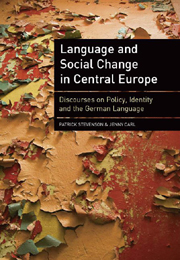Book contents
- Frontmatter
- Contents
- Acknowledgements
- List of Tables
- Transcription Conventions
- Map of Central Europe
- 1 Introduction
- 2 Discourses on Language in Social Life: Theoretical and Methodological Orientations
- 3 Sociolinguistic Histories and the Footprint of German in Eastern Central Europe
- 4 Language Policy Discourses: Interventions and Intersections
- 5 Language (Auto)biographies: Narrating Multilingual Selves
- 6 Language Ideologies: Negotiating Linguistic Identities
- 7 Conclusions
- Appendix A European Institutions and Documents Concerning Language Policy
- Appendix B Preamble to the European Charter for Regional or Minority Languages
- Appendix C Introduction to the 2005 Commission Communication ‘A New Framework Strategy for Multilingualism’
- Appendix D Introduction to the 2008 Commission Communication ‘Multilingualism: an asset for Europe and a shared commitment’
- Appendix E German and Austrian agents and institutions in foreign cultural policy
- Appendix F Extract from ‘Auswärtige Kulturpolitik – Konzeption 2000’
- Appendix G Central focus – ‘Leitbild’ – of the Goethe-Institut
- Appendix H Austria's Auslandskulturkonzept NEU
- Appendix I Plattform Kultur Mitteleuropa – Platform Culture Central Europe
- Appendix J Extract from Austria kulturint – Tätigkeitsbericht 2002
- Appendix K Czech 2001 White Paper on Education
- Appendix L Czech 2004 Education Act
- Appendix M Extract from Czech Follow-up of Action Plan on Language Learning and Linguistic Diversity
- Appendix N Hungarian 1997 Directive Concerning the Education for National and Ethnic Minorities
- Appendix O Extract from 2007 Hungarian National Core Curriculum
- Appendix P Extract from Hungarian Follow-up of Action Plan for Language Learning and Linguistic Diversity
- References
- Index
Appendix D - Introduction to the 2008 Commission Communication ‘Multilingualism: an asset for Europe and a shared commitment’
Published online by Cambridge University Press: 05 February 2013
- Frontmatter
- Contents
- Acknowledgements
- List of Tables
- Transcription Conventions
- Map of Central Europe
- 1 Introduction
- 2 Discourses on Language in Social Life: Theoretical and Methodological Orientations
- 3 Sociolinguistic Histories and the Footprint of German in Eastern Central Europe
- 4 Language Policy Discourses: Interventions and Intersections
- 5 Language (Auto)biographies: Narrating Multilingual Selves
- 6 Language Ideologies: Negotiating Linguistic Identities
- 7 Conclusions
- Appendix A European Institutions and Documents Concerning Language Policy
- Appendix B Preamble to the European Charter for Regional or Minority Languages
- Appendix C Introduction to the 2005 Commission Communication ‘A New Framework Strategy for Multilingualism’
- Appendix D Introduction to the 2008 Commission Communication ‘Multilingualism: an asset for Europe and a shared commitment’
- Appendix E German and Austrian agents and institutions in foreign cultural policy
- Appendix F Extract from ‘Auswärtige Kulturpolitik – Konzeption 2000’
- Appendix G Central focus – ‘Leitbild’ – of the Goethe-Institut
- Appendix H Austria's Auslandskulturkonzept NEU
- Appendix I Plattform Kultur Mitteleuropa – Platform Culture Central Europe
- Appendix J Extract from Austria kulturint – Tätigkeitsbericht 2002
- Appendix K Czech 2001 White Paper on Education
- Appendix L Czech 2004 Education Act
- Appendix M Extract from Czech Follow-up of Action Plan on Language Learning and Linguistic Diversity
- Appendix N Hungarian 1997 Directive Concerning the Education for National and Ethnic Minorities
- Appendix O Extract from 2007 Hungarian National Core Curriculum
- Appendix P Extract from Hungarian Follow-up of Action Plan for Language Learning and Linguistic Diversity
- References
- Index
Summary
Linguistic diversity is a challenge for Europe, but, in our view, a rewarding challenge.
Amin Maalouf, Group of Intellectuals for Intercultural Dialogue)Introduction
The harmonious co-existence of many languages in Europe is a powerful symbol of the European Union's aspiration to be united in diversity, one of the cornerstones of the European project. Languages define personal identities, but are also part of a shared inheritance. They can serve as a bridge to other people and open access to other countries and cultures, promoting mutual understanding. A successful multilingualism policy can strengthen life chances of citizens: it may increase their employability, facilitate access to services and rights and contribute to solidarity through enhanced intercultural dialogue and social cohesion. Approached in this spirit, linguistic diversity can become a precious asset, increasingly so in today's globalised world.
The Commission's renewed social Agenda, adopted on 2 July 2008, set out a new approach to managing change in our globalising world focusing on the key principles of opportunities, access and solidarity. In a multilingual European Union, this means that: i) everybody should have the opportunity to communicate appropriately in order to realise his or her potential and make the most of the opportunities offered by the modern and innovative EU; ii) everybody should have access to appropriate language training or to other means of facilitating communication so that there is no undue linguistic obstacle to living, working or communicating in the EU; iii) in the spirit of solidarity, even those who may not be able to learn other languages should be provided with appropriate means of communication, allowing them access to the multilingual environment.
- Type
- Chapter
- Information
- Language and Social Change in Central EuropeDiscourses on Policy, Identity and the German Language, pp. 216 - 217Publisher: Edinburgh University PressPrint publication year: 2010



